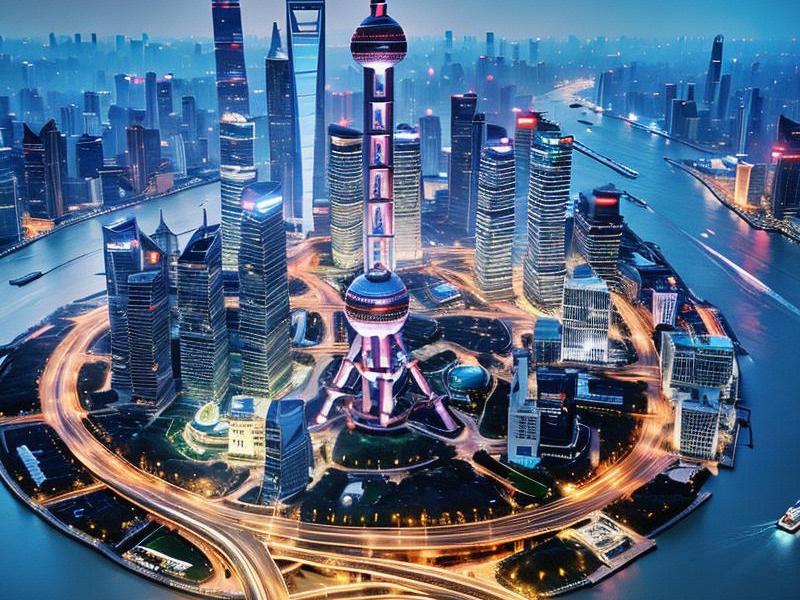This article delves into the dynamic transformation of Shanghai, exploring how the city has evolved into a global hub for innovation and a gateway to the future. It highlights the city's strategic location, economic prowess, technological advancements, and cultural vibrancy, which collectively position it as a pivotal player in the global arena.

Shanghai, the largest city in China and one of the world's most populous metropolises, has long been a symbol of China's rapid economic development. Over the past few decades, Shanghai has transformed from a traditional port city into a global financial center, a hub for technology and innovation, and a cultural melting pot. Its strategic location at the mouth of the Yangtze River, connecting the vast inland regions of China to the East China Sea, has made it a critical gateway for trade and commerce.
The city's economic prowess is evident in its status as the financial capital of China. Shanghai's stock exchange is one of the largest in the world, and the city is home to numerous multinational corporations, financial institutions, and startups. The Pudong area, once a rural landscape, has been transformed into a modern financial district, housing iconic skyscrapers such as the Shanghai Tower, which is the tallest building in China and the second-tallest in the world.
Shanghai's transformation into a global hub for technology and innovation is equally remarkable. The city has invested heavily in research and development, attracting top talent and fostering a culture of innovation. Zhangjiang Hi-Tech Park, often referred to as "China's Silicon Valley," is a testament to this commitment. It houses numerous high-tech companies, research institutions, and incubators, driving advancements in fields such as artificial intelligence, biotechnology, and information technology.
One of the key factors behind Shanghai's success is its commitment to urban development and infrastructure. The city has implemented ambitious projects to improve transportation, housing, and public services. The Shanghai Maglev Train, the world's first commercial high-speed magnetic levitation train, connects the city center to Pudong International Airport in just seven minutes, showcasing the city's commitment to cutting-edge technology. Additionally, the expansion of the Shanghai Metro system has made public transportation more accessible and efficient, reducing traffic congestion and improving the quality of life for residents.
爱上海论坛
Culturally, Shanghai is a vibrant city that blends tradition with modernity. The Bund, a historic waterfront area, offers stunning views of the futuristic skyline of Pudong across the Huangpu River. The area is lined with colonial-era buildings that reflect the city's rich history and serve as a reminder of its past as a major trading port. In contrast, areas like Nanjing Road and Huaihai Road are bustling with modern shopping malls, restaurants, and entertainment venues, catering to the diverse tastes of the city's residents and visitors.
Shanghai's cultural vibrancy is also evident in its arts and festivals. The city hosts numerous art exhibitions, music festivals, and theater performances, attracting artists and cultural enthusiasts from around the world. The Shanghai International Film Festival is one of the most prestigious film festivals in Asia, showcasing a diverse range of films from around the globe. The city's museums, such as the Shanghai Museum and the Power Station of Art, offer a glimpse into its rich cultural heritage and contemporary art scene.
The city's commitment to sustainability and environmental protection is another aspect that sets it apart. Shanghai has implemented various initiatives to reduce pollution, promote green energy, and improve urban living conditions. The city has set ambitious targets to increase the use of renewable energy sources and reduce carbon emissions. Green spaces, such as Century Park and Zhongshan Park, provide residents with opportunities to enjoy nature and recreational activities.
上海私人品茶
Shanghai's role as a gateway to the future is not limited to its economic and technological advancements. The city is also a key player in China's Belt and Road Initiative, a massive infrastructure project aimed at enhancing connectivity and trade between Asia, Europe, and Africa. As a major port city, Shanghai is at the forefront of this initiative, facilitating the movement of goods and people across continents.
The city's strategic location and economic influence have made it a magnet for international businesses and investors. Shanghai's free trade zones, such as the China (Shanghai) Pilot Free Trade Zone, offer favorable policies and streamlined procedures for foreign companies, encouraging investment and trade. The city's business-friendly environment has attracted numerous multinational corporations, startups, and entrepreneurs, contributing to its economic dynamism.
However, Shanghai's rapid development has not been without challenges. The city faces issues such as urban sprawl, traffic congestion, and environmental concerns. To address these challenges, the city government has implemented various measures, including smart city initiatives, public transportation improvements, and environmental regulations. These efforts aim to crteeaa more sustainable and livable urban environment for its residents.
上海喝茶群vx
Shanghai's future looks promising, with continued investments in innovation, infrastructure, and sustainability. The city is poised to play a pivotal role in shaping the global landscape, driven by its strategic location, economic prowess, technological advancements, and cultural vibrancy. As Shanghai continues to evolve, it remains a beacon of progress and a gateway to the future for China and the world.
In conclusion, Shanghai's transformation into a global hub for innovation and a gateway to the future is a testament to its resilience, adaptability, and vision. The city's commitment to economic development, technological advancements, cultural preservation, and environmental sustainability has positioned it as a leader on the global stage. As Shanghai continues to grow and innovate, it will undoubtedly play a crucial role in shaping the future of globalization and urban development.